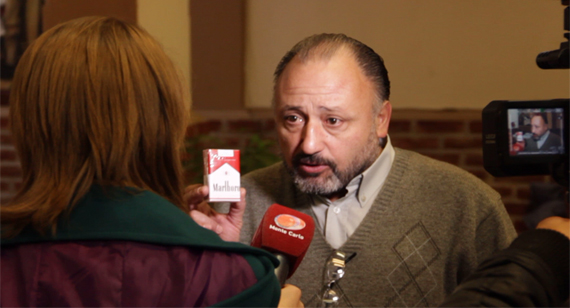|
On
May 31, on occasion of the World No Tobacco Day, the Autonomous Tobacco Workers’
Union (SAT) held a press conference to address several issues.
Sirel spoke with SAT general
secretary Gerardo Pereira about it.
-What issues did you
address in the press conference?
-On World No Tobacco
Day we wanted to use this contact with the national media to remind the public
that seven months and ten days ago Philip Morris closed its offices and
plants in Uruguay leaving more than 60 people out of work. Forty-five of
these were workers represented by our union and the remaining 15 were
administrative personnel.
We also wanted to
remind the government that under the Framework Convention [the WHO Framework
Convention on Tobacco Control] on which the National Anti-Smoking Campaign is
based there are certain provisions that make signatory governments accountable
to tobacco workers and growers affected economically and socially by this
campaign, binding them to assist these workers with concrete solutions. But we
haven’t had any solution from the government yet.
Last Tuesday, May 29,
we presented President José Mujica with a letter from the IUF
supporting our petition, which was approved at the 26th Congress
of the IUF recently held in Geneva, Switzerland, and signed by trade
union representatives from across Latin America, Spain, Italy,
and France.
|
After the local factory closed, street markets, newsstands, and
neighborhood grocery stores started selling Marlboro cigarettes for US$
2. These cigarettes, as can be seen on the label, are produced in
Argentina, and they’re smuggled into the country. |
We hope to receive a
positive sign from the government.
-You also made a public
denunciation...
-Yes. We denounced that
after the local factory closed, street markets, newsstands, and neighborhood
grocery stores started selling Marlboro cigarettes for US$ 2. These
cigarettes, as can be seen on the label, are produced in Argentina, and they’re
smuggled into the country.
These products are
smuggled by the transnational corporation itself and they lack the warnings that
cigarettes are required by Uruguayan law to feature on their labels. We believed
it was necessary to alert the Ministry of Public Health and other relevant
bodies to this alarming situation, which we had predicted would occur sooner or
later, as Philip Morris closed its factory but is not willing to give up
the Uruguay market; it’s just looking to get back at the government.
This unfair competition
leads to more job losses as it harms the sales of national companies that
continue to operate in the domestic market.
-How many of the fired
workers are still unemployed?
-Of the workers who
were fired, seven were absorbed by the tobacco company Monte Paz, and
there are possibilities that others will be hired in the next few months. Some
others have found jobs, but through their own efforts.
Unfortunately, the
government has not achieved absolutely anything so far. This is aggravated by
the fact that as of April the laid-off workers who are under 50 are no longer
covered by unemployment insurance as the mandatory six-month period that all
workers are entitled to expired. We requested an extension of that coverage but
the Ministry of Labor refused, saying it was not legally possible. That means
that almost 20 of the laid-off workers are not even receiving unemployment
insurance.
Things are pretty
tough, because we the government didn’t even help us in that sense, when it has
an obligation under an international convention to provide assistance to anyone
who is affected as a consequence of anti-tobacco programs.
 |